Uncovering the Oldest Horse Ever Recorded
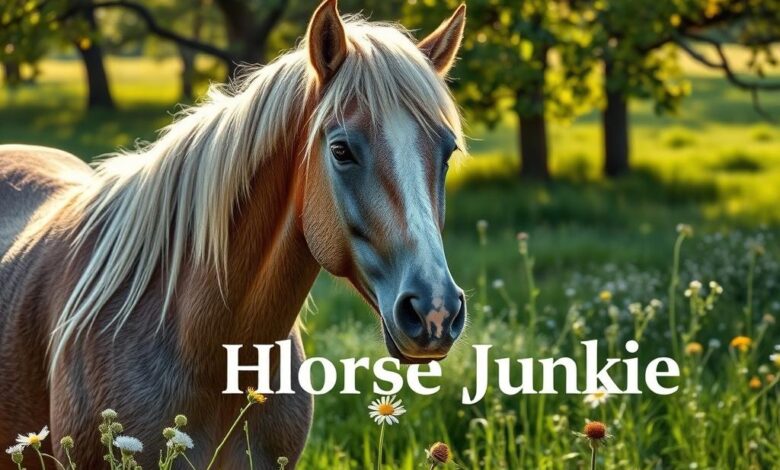
Imagine a horse that lived for an incredible 62 years. Meet Old Billy, the oldest horse ever recorded. His life story is full of wonder and teaches us about the long lives of horses.
Old Billy was born in 1760. His age of 62 is a record that shows us what makes a horse live long. In a world where most horses live for 25 to 30 years, Old Billy’s story is truly inspiring. It makes us think about genetics, diet, and environment’s role in a horse’s health.
Let’s explore the secrets of long-lived horses and celebrate Old Billy’s life. His story will inspire horse owners today and tomorrow.
Key Takeaways
- Old Billy holds the record for the oldest horse ever, living to 62 years old.
- The average lifespan of a horse ranges from 25 to 30 years.
- Factors influencing horse longevity include genetics, diet, and lifestyle.
- Other notable aging horses include Sugar Puff and Badger, who lived to 56 and 51 years, respectively.
- Understanding horse care plays a crucial role in extending a horse’s lifespan.
Introduction to the Oldest Horse Ever
Learning about the lifespan of horses is key to their health and care. Most horses live between 25 to 30 years. But, some horses have lived up to 40 or 50 years. This shows us how important it is to take good care of them.
By understanding what makes horses live longer, we can help them more. This lets us celebrate their lives fully.
Definition of Lifespan in Horses
The lifespan of a horse is how long they can live, and it varies a lot. Healthy horses usually live 25 to 30 years. But, some horses, like Old Billy, have lived over 60 years.
This helps us see that every horse’s life is different. It’s important to understand this.
Importance of Studying Horse Longevity
Studying how long horses live helps us improve their lives. Every horse’s life is special, and we can learn from those who live long and healthy. Knowing what affects a horse’s longevity helps owners make better choices.
This knowledge helps us care for our horses better. It gives us the power to support our equine friends.
Celebrating the Record Holder: Old Billy
Old Billy is a legendary horse known for his long life. He was born in 1760 at Wilgreave Farm in Woolston, England. His life spanned nearly three times that of the average horse.
He worked for the Mersey and Irwell Navigation Company. His role was to pull boats, showing great stamina and strength. For 56 years, he worked hard until he retired in 1819. He died in 1822 at 62, making him a key figure in horse history.
Overview of Old Billy’s Life
Old Billy started working at three for the Mersey and Irwell Navigation Company. He pulled boats, showing amazing stamina and strength. For 56 years, he worked hard until he retired in 1819.
He passed away in 1822 at 62, marking him as a key figure in horse history.
Significance of His Age
Old Billy’s age has amazed people for generations. His long life challenges our understanding of horse lifespans. It shows the importance of proper care and nutrition.
His story inspires us, showing that horses can live long lives with the right support.
The Role of Old Billy in Horse History
Old Billy’s legacy goes beyond his age. He is a symbol in equine history. His taxidermied head is in museums, showing the importance of aging horses.
By celebrating his journey, we honor the vital role horses have played in human history. It deepens our appreciation for our equine friends.
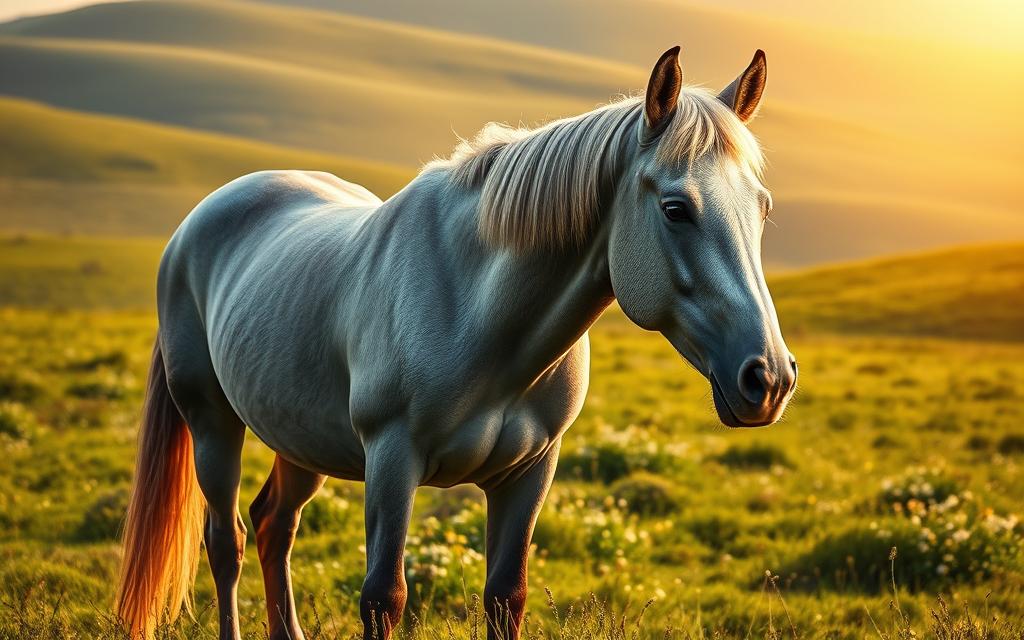
Factors That Contribute to Horse Longevity
Many health factors are key to a long life for horses. Knowing what helps them live longer is important for horse owners. It helps them give their animals the best care.
Genetics and Breed Considerations
Genetics play a big role in how long a horse lives. Some breeds live longer than others. For example, ponies often live longer than draft horses.
Arabian horses can live up to 30 years. Thoroughbreds can live up to 35 years. The oldest horse, Old Billy, lived to be 62 years old. This shows some breeds can live a very long time.
Nutrition and Diet’s Impact
A good diet is key for a horse’s health and long life. Eating right helps avoid sicknesses like colic and laminitis. These sicknesses can shorten a horse’s life a lot.
By giving our horses the right food, we can help them stay healthy. This can help them live longer.
Exercise and Lifestyle Choices
Exercise is important for a horse’s health and happiness. Keeping them active keeps them physically and mentally strong. It also helps them live longer.
Also, a safe and clean place to live is important. So is being with other horses. These things help horses live a long and happy life.
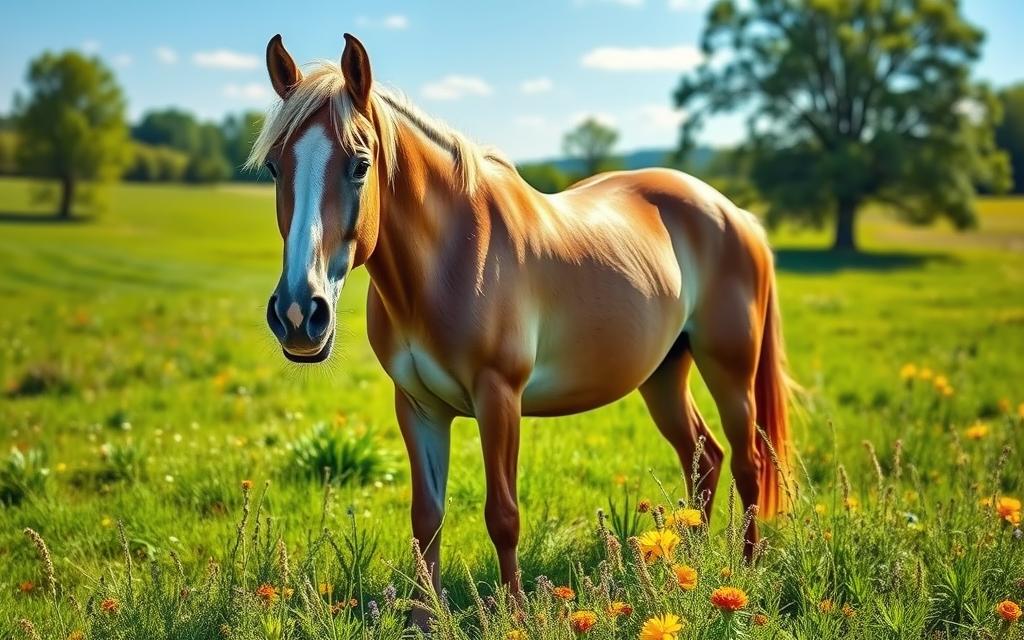
Notable Aging Horses Throughout History
Stories of horses living long lives amaze and inspire us. Horses like Old Billy have shown us that they can live much longer than expected. Let’s look at some of these remarkable horses who have left their mark on history.
The Story of Sugar Puff
Sugar Puff, a Welsh mare, lived an incredible 56 years. She broke all records for the longest living horse. Her life shows us how good care can help horses live longer.
Sugar Puff’s story teaches us about the importance of care and nutrition for aging horses.
The Life of Badger
Badger, an Arab-Welsh Cross, lived to be 51 years old. His long life caught the eye of many. Badger’s story shows that horses can live well into their golden years.
His life gives us valuable lessons on how to care for older horses.
Other Remarkable Aging Horses
- Shayne, an Irish Draught, lived to 51 years.
- Scribbles, a pony, reached an age of 51.
- Magic, a Polish Arabian, made it to 46 years.
- Orchid, the oldest female horse, lived either 49 or 50 years.
Horses like Shayne, Scribbles, Magic, and Orchid show us that with the right care, they can live up to 50 years. Their lives inspire us and push us to learn more about how to help horses live longer.
Common Myths About Horse Lifespan
Knowing the truth about how long horses live is key for any owner. We often hear many wrong ideas about horse lifespan. These myths about aging horses can lead to bad care and management. By clearing up these myths, we can help our horses live better lives.
Debunking Age-Related Myths
Many think horses just get old without needing special care. But this is not true. Horses can age well, but they need our attention as they get older. It’s important to remember that good care helps them live longer.
Misconceptions About Nutrition
Some believe older horses don’t need as much food. But older horses often need special diets to stay healthy. Wrong ideas about food can hurt their health and how long they live.
Training Misbeliefs
Many think older horses can’t be trained anymore. They believe once a horse gets old, it should stop all physical activities. But this is not true. Older horses can still do well with the right training, staying active and happy. Knowing the truth about misconceptions about horse lifespan helps us care for them better.
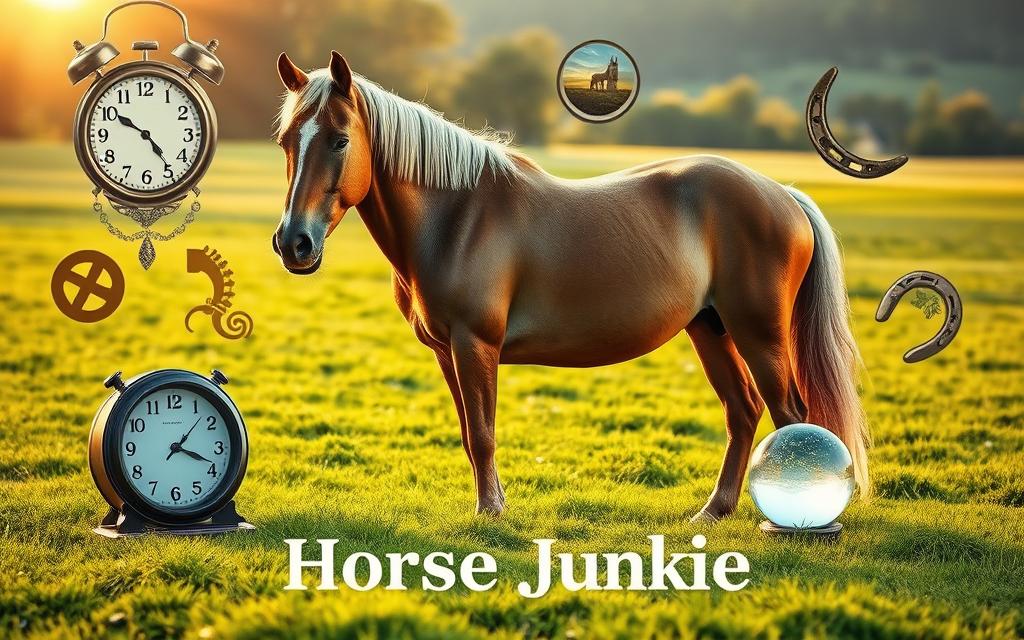
How to Care for Aging Horses
We need to focus on their diet, regular vet visits, and adjusting their activities. This helps them stay healthy and happy as they get older.
Essential Dietary Needs
Older horses often need more calories to stay at a good weight. Foods like soaked beet pulp and alfalfa cubes are easier to chew. It’s important to give them high-quality food and supplements to keep them healthy.
Regular Veterinary Check-ups
Regular vet visits are key for older horses. They can get conditions like arthritis and dental problems. Regular check-ups help catch these issues early, so we can treat them quickly.
Adaptation of Physical Activities
As horses age, they need less intense exercise. Gentle activities help keep them flexible and strong. We should make sure they have enough space to move and adjust their activities if needed. This improves their quality of life.
The Role of Environment in Horse Longevity
The environment where a horse lives is key to its health and long life. Knowing how different factors in the environment can help us care for our horses better. We need to think about several parts of a horse’s environment.
Barn Conditions and Their Effects
Good barn conditions are vital for our horses’ health. We must ensure good air flow, cleanliness, and the right bedding. This helps avoid breathing problems and keeps them comfortable.
A clean and well-kept barn also lowers stress. This makes our horses more likely to live longer and healthier lives.
Social Interactions with Other Horses
Horses do best when they have friends. Being around other horses helps them feel less anxious and behave naturally. This friendship is good for their health and can make them live longer.
Access to Pasture and Space
Having enough space for horses to graze and roam is important. It lets them exercise, which keeps them healthy and fit. A good environment with plenty of space helps our horses stay healthy and full of life.
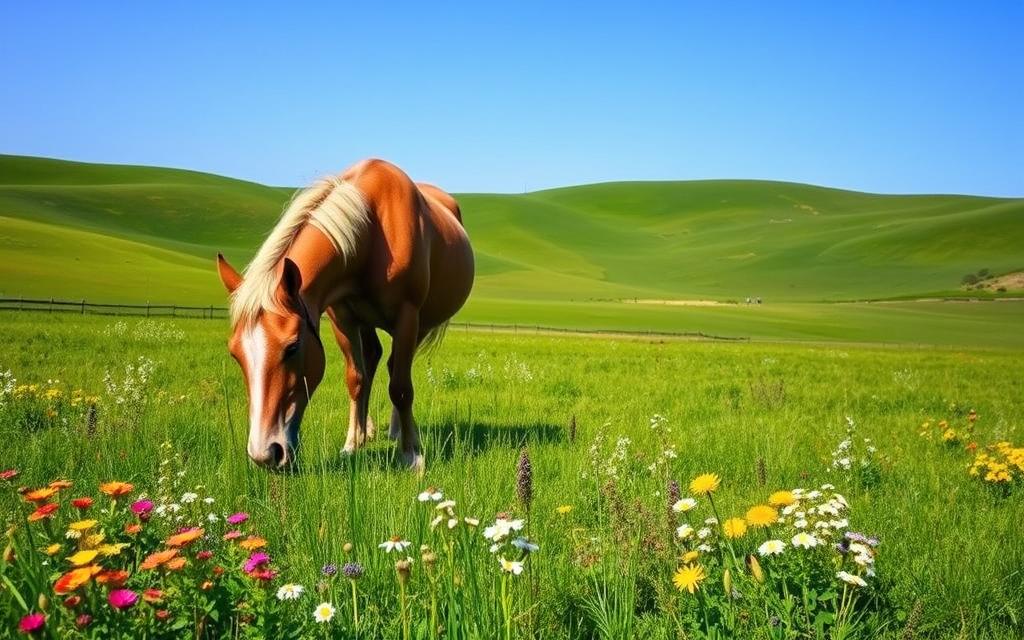
The Emotional Bond Between Horses and Humans
The bond we share with horses is more than just friendship. It helps us understand how to improve their lives. This bond affects their happiness and health. Our time with these animals builds a relationship based on respect and love.
Understanding the Connection
Horses are pack animals that love to be in groups, just like families. They need friends, especially when they’re young. Studies show horses can read our emotions, using their faces to show if they’re happy or upset.
The Impact of Quality Care on Lifespan
Good care is key to a long life for horses. Grooming and training help build trust. This trust lets us connect on a deeper level. It also keeps them physically and emotionally healthy.
Studies show our time together can calm both us and our horses. This shows how our bond can have a positive effect.
Stories from Horse Owners
Horse owners have many touching stories about their bond with their horses. These stories show how friendship and understanding can change a horse’s life. From grooming at night to riding together, every moment strengthens our connection.
Seeing how quality care can transform a horse’s life is truly inspiring. It shows the importance of caring for these special animals.
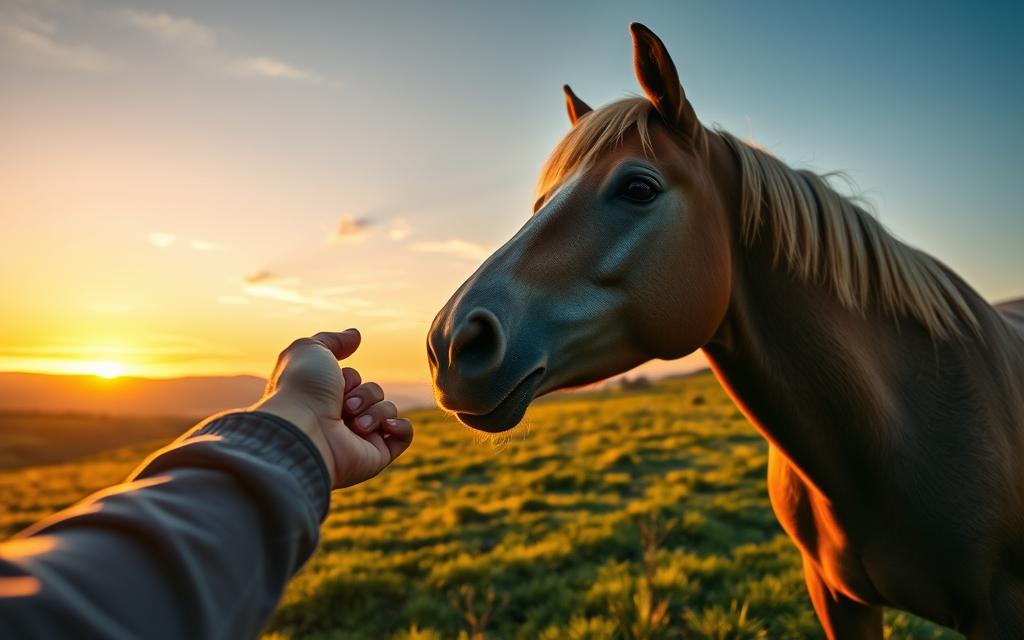
Future Research on Horse Lifespan
The study of horse lifespan is always growing. New discoveries in veterinary care show how important it is to care for aging horses. This helps horses live longer and healthier lives.
Scientific Studies in Equine Longevity
Studies look at many things that affect a horse’s life span. They explore genetics, breed traits, and lifestyle choices. For example, Percherons and Quarter Horses often live longer than smaller breeds like Miniature horses.
Learning about these differences helps us improve care for all horses.
Advances in Veterinary Medicine
New vet medicine is key for our aging horses. It brings better ways to diagnose and treat health problems. Regular vet visits and care plans are vital for keeping horses healthy as they age.
The Importance of Data Collection
Gathering data is crucial for horse lifespan research. It helps us understand hereditary traits, nutrition, exercise, and more. This information leads to better care and helps spot health trends in different horses.

The Influence of Culture on Horse Perception
Horses have been important in our culture for a long time. They show up in myths and stories, symbolizing strength, freedom, and nobility. These stories tell us a lot about how people see horses, showing their deep importance.
Horses in Mythology and Folklore
Horses have always been linked with power and prestige in myths. In ancient times, like in China and the Mongol Empire, they were key in battles and trade. They were seen as symbols of civilization.
For example, Emperor Wu Ti’s war against the Hsiung-nu showed how important good horses were for winning. These stories show how much people respected horses, making them a big part of our history.
The Symbolism of Aging Horses
How we see older horses has changed over time. Once just work animals, now they are seen as friends, full of wisdom and endurance. This change shows how our views on horses have grown, making us care for them more as they age.
Changing Views on Horses Over Time
Our views on horses have changed as society has. Until the 1930s, many people remembered horses being a big part of their lives. This nostalgia is seen in books and art, where horses stand for nobility and freedom.
These roles of horses have changed over time. They went from being essential work animals to being celebrated figures in our culture today.
Conclusion: Reflecting on What We Learned
As we wrap up our look at Old Billy, we think about more than just his long life. We also consider the bigger picture of aging horses. Old Billy, the oldest horse ever, shows us the unique path each horse takes. His story teaches us how to care for these amazing animals as they age.
Summarizing the Journey of Old Billy
Old Billy’s story is more than just a record. It highlights the crucial role we play in the lives of aging horses. By understanding their needs, we can make their later years happy and fulfilling. Learning from horses like Old Billy reminds us of their enduring spirit.
The Importance of Acknowledging Aging Horses
Our duty to aging horses goes beyond just feeding and housing them. They need our respect, care, and understanding as they get older. By creating environments that support their physical and emotional health, we honor their legacy and deepen our connection with them.
Our Responsibility as Equine Caretakers
Reflecting on Old Billy’s life teaches us a lot about our role as horse caretakers. Recognizing the value of aging horses helps us appreciate their role in human history and society. The stories of horses like Old Billy inspire us to build a better world for them, where their tales will live on for generations to come.
FAQ
What is the oldest horse ever recorded?
What factors contribute to equine longevity?
How can I care for an aging horse?
Is there a difference in lifespan among horse breeds?
What are some common myths about horse lifespan?
How does environment impact a horse’s lifespan?
What role does emotional connection play in horse longevity?
Are there any notable horses known for their long lives?
What is the significance of Old Billy in horse history?
How can scientific research improve understanding of horse lifespan?
Source Links
- One of world’s oldest horses, 45, goes viral for “living her best life”
- Head of world’s oldest horse returns to Warrington
- Old Billy The Barge Horse – Historic UK
- the older horse
- The World’s Oldest Thoroughbred? We Think We Have Found Him
- The fascinating tale of the world’s oldest horse
- Fascinating story of Warrington’s ‘Old Billy’, the world’s oldest horse, to be told in new children’s book
- How Long Do Horses Live?
- Horse Lifespan: How Long Do Horses Live?
- 10 Oldest Horses in the World – Oldest.org
- Geriatric horse
- 12 Famous Horses From History
- 10 fun facts about horses
- How Long Do Horses Live For? Find Out & Be Amazed with Us!
- Riders with horses in their 20’s +… what tips would you want someone with an aging horse (in work) to know?
- Care Strategies for Senior Horses
- What’s Age Got to Do with It? Caring for Geriatric Horses
- How Long Do Horses Live? The Answer Is – It Depends
- How Long Do Horses Live?
- How Long Do Horses Live? | Horse Lifespan Guide
- 10 Things That Make Horse & Human Relationships So Unique | Agape
- The Evolution of our Relationship with Horses | Tsylos
- Equus “Story of the Horse” ~ About | Nature | PBS
- How Long Do Horses Live? The Answer Is – It Depends
- The Effect of Age on Thoroughbred Racing Performance
- Immunosenescence and inflammaging in the aged horse – Immunity & Ageing
- untitled
- February/April 1990
- The Impressiveness of the Horse — Warren Christian Apologetics Center
- Horse – Evolution, Domestication, Anatomy | Britannica
- 18.5E: The Fossil Record and the Evolution of the Modern Horse



